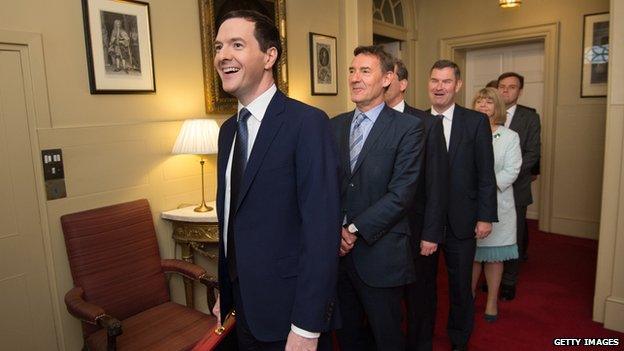Osborne ends Britain's big squeeze
- Published
- comments

So it turns out George Osborne did not need LibDems in government to tell him to take off his hair shirt.
Because today's Budget is massively less austere than the one forged with them in March, just before the election.
By the end of the parliament the chancellor is now planning to cut public services by just under £18bn a year. Which is not trivial but is considerably less than half the £42bn in cuts he had been proposing by 2018-19.
These are no longer cuts viewed by most economists and politicians as madly ideological and unrealistic.
How and why the lesser squeeze?
Well for all George Osborne's rhetoric that he's a low tax chancellor, he actually announced tax rises that will raise him £47bn over the next five years, according to his own creation, the Office for Budget Responsibility.
Those tax rises include around £2bn a year from the reform of dividend tax and £1.5bn per annum from a hike in insurance premium tax.
Those tax rises contrast with just £25bn given away with populist increases in the tax-free and 40% income-tax thresholds, and a promised two percentage point reduction in the headline rate of corporation tax (and, by the way, with a pledged corporation tax rate of 18%, some competitor countries may start to see Britain as almost a tax haven for multinationals).
Mending the roof
Two other big points are worth making.
The £12bn of welfare and social security cuts are being phased in over four years rather than two. But they will still be extremely painful for millions of people, especially middle-income families - who will take much of the strain of tax-credit reforms that will raise around £4.5bn every year.
Also George Osborne is not mending Britain's roof in the sunshine - to employ his favourite cliché - as quickly as he said he would in the pre-election spring.
Then he promised he would be spending less than he raises from taxes by 2018-19. This afternoon that surplus was postponed to 2019-20.
And the OBR says the national debt will be £18bn higher by 2020 than promised in March, with £3.5bn of this extra borrowing directly traceable to today's budget decisions.
Oh and it is also quite striking that a Tory government that says it fervently believes in markets is behaving like 1970s Labour, in creating a new official living wage - because it represents an attempt to fix the price of most businesses' most important cost, people, significantly higher than the current minimum wage.